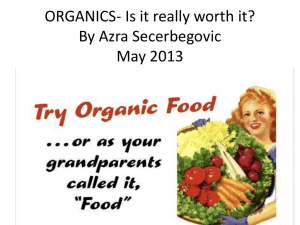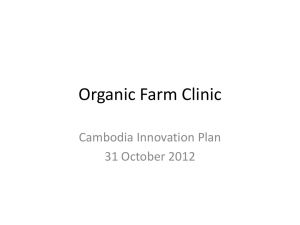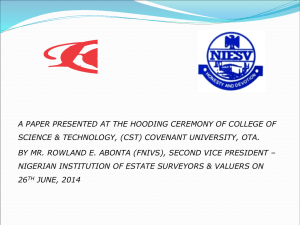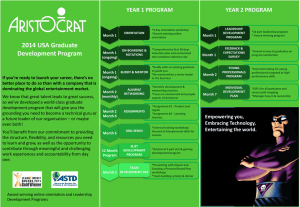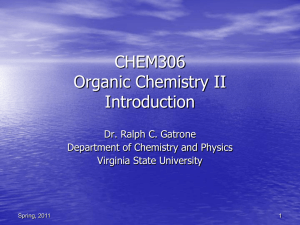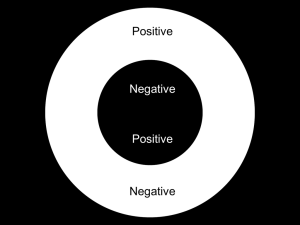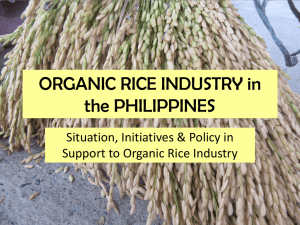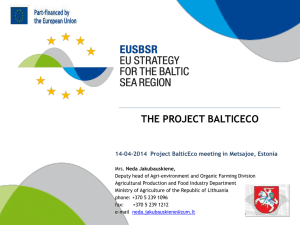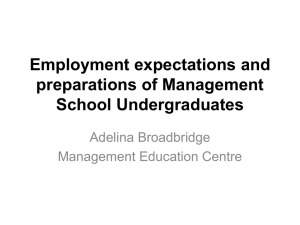(WELP) for developing entrepreneurship in organic agriculture
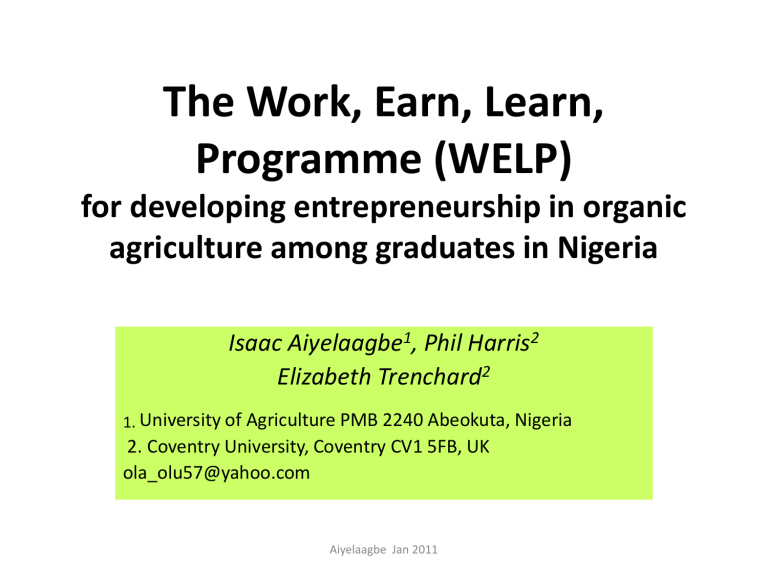
The Work, Earn, Learn,
Programme (WELP)
for developing entrepreneurship in organic agriculture among graduates in Nigeria
Isaac Aiyelaagbe 1 , Phil Harris 2
Elizabeth Trenchard 2
1.
University of Agriculture PMB 2240 Abeokuta, Nigeria
2. Coventry University, Coventry CV1 5FB, UK ola_olu57@yahoo.com
Aiyelaagbe Jan 2011
Graduate unemployment
• Graduate unemployment accounted for 32% of the unemployed in Nigeria 1992-97
Dabalen et al, 2000
• > 50% of graduates in Nigeria are now unemployed (or underemployed)
Okonjo-Iweala 2010
• Nigeria now produces > 3,000 agricultural graduates annually
• 75% of agricultural graduates would rather not take up agriculture related careers
Aiyelaagbe Jan 2011
Why graduate unemployment?
• Poor response by Universities to changing job market demands
• Graduates possess skills that the job market no longer requires ( obsolete ?)
• Graduates lack skills that the job market requires ( incompetent ?)
• Graduates lack capacity to be innovative
( entrepreneurship ?)
Aiyelaagbe Jan 2011
Agriculture
• Contributes 33 – 42% of GDP in Nigeria
• High comparative advantage in agriculture could be tapped for national development by engaging unemployed agricultural graduates
• Globalisation offers new opportunities to optimize the potential
• New emerging markets such as international trade organic produce could be accessed
Aiyelaagbe Jan 2011
Organic agriculture
• A unique and regulated system of producing and handling food and fibre
• Exploits the benefits of ecological cycles for sustainability
• Excludes the use of synthetic agrochemicals which could be harmful to human health and the environment now or later
• Promotes ethics in production and trade
Aiyelaagbe Jan 2011
Trade in organic produce
60
50
40
30
20
10
0
2001 2002 2004
Year
2007 2008
Fig.1 Value of global trade in organic agriculture
Aiyelaagbe Jan 2011
Barriers to access
• Low local awareness
• Paucity of local skills in production, handling, certification and trade in organic produce
• Up to 2008, < 6% of faculties of agriculture in
Nigeria featured organic agriculture in their curricula; conventional agriculture was the focus
• To access the organic market, the skills gap of graduates needs to be bridged
Aiyelaagbe Jan 2011
WELP
• WELP was conceived to bridge skills gap by developing entrepreneurship in organic agriculture among graduates in Nigeria
• Work provides hands-on experience,
• Earn income to sustaining participation
• Learn acquire new skills and attitudes to gain access to market
Aiyelaagbe Jan 2011
Components of WELP
1. 4-week , intensive graduate conversion course in organic agriculture, including enterprise skills
2. 3-week internship in the private sector
3. Visits to successful organic businesses overseas - from production to consumer
4. Mentoring to develop business plans
5. Support for business start up, marketing etc
Aiyelaagbe Jan 2011
Methodology
• WELP advertised
• Open access
• 70 applications received
• 23 applicants selected
• 6 partner farmers selected to host interns
• Successful candidates informed
• Course resumed in March (fully residential)
Aiyelaagbe Jan 2011
Course content and evaluation
• Class room lectures based on draft curriculum
• Field demonstration/practice
• Interactive sessions
• Written quiz
• Evaluation report submitted by partner farmers
• Proficiency certificate awarded to all successful candidates
• Travel grants awarded to top 5 trainees to visit successful organic businesses
Aiyelaagbe Jan 2011
Outputs
• Evaluation of draft curriculum on organic agriculture in HEIs
• Evaluation of WELP
• Linkages with farmers
• New small scale organic businesses initiated
• Increased public awareness on organic agriculture
• Increased demand for training
Aiyelaagbe Jan 2011
Trainees’ preferences for post-training
organic enterprise establishment
Aiyelaagbe Jan 2011
Evaluation
• Participation
• Written quiz
• Evaluation report submitted by partner farmers
• Post training evaluation
• Proficiency certificate awarded to all successful candidates
• Travel grants awarded to top 5 trainees to visit successful organic businesses
Aiyelaagbe Jan 2011
Future outlook
• Follow up WELP graduates
• Reconfigure curriculum of degree programme in agriculture to include entrepreneurship
• Design post graduate programmes
• Increase number of conversion courses
• Internationalise WELP by reaching out in the
West –African sub region
Aiyelaagbe Jan 2011
Acknowledgements
• UK Department of Business,
Innovation and Skills
• British Council
Aiyelaagbe Jan 2011

